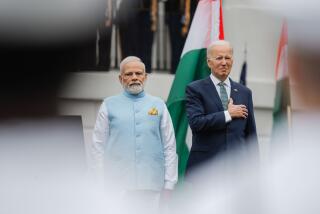India Slams the Door : Termination of deal with U.S. firm could negate four years of wooing foreign investment
- Share via
Never underestimate India’s ability to shoot itself in the foot.
After spending the last four years wooing foreign investment, India sent a message last week that it may turn back the clock. The government of the state of Maharashtra said it was scrapping a $2.8-billion deal with a consortium led by the Houston-based Enron Corp. to build a badly needed electrical power plant 100 miles south of Bombay.
The action threatens improving economic relations with the United States, where scores of firms have lined up to do deals and the Clinton Administration has sent a procession of Cabinet secretaries to visit India and drum up business.
The Maharashtra government says the Enron case involves just one contract and that it welcomes other investments. But it is naive to believe that other companies will not think twice about shoveling money into a country with an uncertain investment climate.
Last March a coalition of two Hindu nationalist parties ousted Maharashtra’s Congress Party government after an election campaign that included a promise to “investigate thoroughly” the Enron deal. The coalition played to the strong suspicions many Indians hold about multinational companies. The new state government said Enron was charging too much for the power it would supply and got too favorable terms from the previous government.
The elections in Maharashtra and other states in the last year have been a setback for the Congress Party, which under the leadership of Prime Minister P. V. Narasimha Rao has wisely tried to move India forward with help from the outside.
One of the tragic legacies of colonialism was the suspicion of foreign firms and institutions. It was understandable that after independence in 1947 the country would seek to be self-sufficient in almost everything from agriculture to steel, but the economic barriers stayed up too long.
Then-Prime Minister Indira Gandhi’s expulsion of Coca-Cola and IBM in the 1970s sent many multinationals scurrying away. The order to stop construction on the power plant may yet turn out to be a negotiating ploy to wring better terms from Enron. But anyone who has sweltered in the Indian heat, when the electricity fails and the fans and air conditioners stop, knows that electricity is desperately needed if India is to move ahead.
The Maharashtra government’s ill-advised action may lure voters temporarily in its battle against the Congress Party but it has hurt its own citizens.
More to Read
Sign up for Essential California
The most important California stories and recommendations in your inbox every morning.
You may occasionally receive promotional content from the Los Angeles Times.













